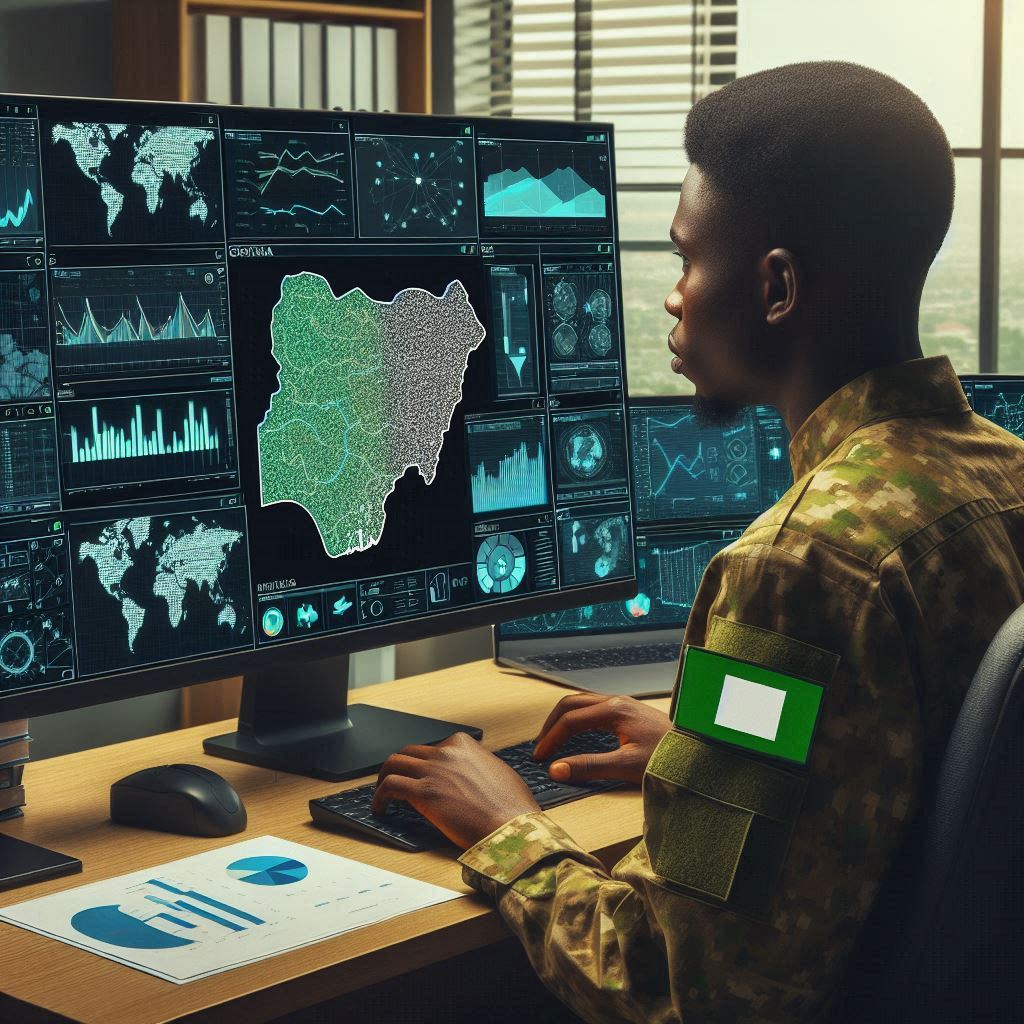Introduction
In Nigeria’s dynamic development landscape, Geographic Information Systems (GIS) and cartography serve as indispensable tools for spatial data analysis, planning, and decision-making.
These technologies are instrumental in tackling complex challenges across various sectors, including urban development, agriculture, health, and disaster management.
Brief Overview of GIS and Cartography
GIS enables the capture, storage, analysis, and presentation of spatial data, allowing users to visualize patterns, trends, and relationships on maps.
Cartography complements GIS by focusing on the art and science of mapmaking, ensuring accurate representation and effective communication of spatial information.
Importance of GIS and Cartography in Nigeria
The significance of GIS and cartography in Nigeria spans diverse sectors.
From urban planning and infrastructure development to environmental conservation and emergency response, these tools support evidence-based decision-making, enhance resource management, and foster sustainable development.
Purpose of the Blog Post
This blog post aims to explore the landscape of GIS and cartography training centers in Nigeria.
By providing insights into the availability, scope, and impact of these centers, we aim to highlight the crucial role they play in nurturing a skilled workforce, promoting innovation, and advancing geospatial technologies across the country.
List of GIS and Cartography Training Centers in Nigeria
Major Training Centers Across the Country
In Nigeria, several institutions offer training in Geographic Information Systems (GIS) and cartography.
These centers cater to a diverse range of learners, including students, professionals, and researchers.
Universities, Government Agencies, and Private Institutions Offering GIS and Cartography Courses
Among the prominent training hubs are universities, government agencies, and private institutions. These entities play a crucial role in building the capacity of geospatial professionals in Nigeria.
Brief Descriptions of Each Training Center
- University of Lagos (UNILAG): UNILAG offers comprehensive training encompassing both theoretical concepts and practical applications.
- Ahmadu Bello University (ABU): ABU’s Department of Geography offers a structured program covering spatial analysis, map design, and remote sensing techniques.
- National Space Research and Development Agency (NASRDA): NASRDA specializes in satellite imagery analysis and geospatial technologies, offering specialized training.
- Federal School of Surveying, Oyo: This institution offers diploma and certificate courses tailored to meet industry demands.
- Geo-Information Society of Nigeria (GEOSON): GEOSON organizes workshops, seminars, and certification programs aimed at professionals seeking to enhance their GIS skills.
- Nigerian Institute of Surveyors (NIS): NIS offers training programs to enhance GIS skills and certification for professionals.
- Center for Geospatial and Environmental Research (CGER): CGER offers specialized training in GIS software and applications for government agencies and private companies.
- Geospatial Technologies and Applications Center (GTAC): GTAC offers hands-on training in GIS software and applications for government agencies and private companies.
- Lagos State Geospatial Information Services (LAGIS): LAGIS conducts training workshops and seminars focusing on GIS and cartography for government officials and urban planners.
- Center for Remote Sensing and Geographic Information Services (CERGIS): CERGIS offers training programs in remote sensing, GIS, and digital mapping for students and professionals.
These training centers play a vital role in nurturing skilled professionals and advancing geospatial technologies across Nigeria.
Read: Challenges in Nigerian Curriculum Studies
Curriculum and Course Offerings
Each training center in Nigeria offers a distinct curriculum tailored to meet industry demands and equip learners with essential skills in GIS and cartography.
Detail the Courses Offered by Each Training Center
- University of Lagos (UNILAG): UNILAG’s curriculum covers spatial analysis, map design, remote sensing, and GIS applications in urban planning and environmental management.
- Ahmadu Bello University (ABU): ABU offers specialized courses in advanced GIS techniques, spatial modeling, and thematic mapping.
- National Space Research and Development Agency (NASRDA): NASRDA provides training in satellite imagery analysis, digital image processing, and GIS data management.
- Federal School of Surveying, Oyo: The curriculum covers surveying, mapping, and GIS fundamentals, including geodetic surveying and cadastral mapping.
- Geo-Information Society of Nigeria (GEOSON): GEOSON offers workshops on GIS software applications and geospatial analysis techniques.
- Nigerian Institute of Surveyors (NIS): NIS offers certification programs in cadastral mapping, GPS surveying, and GIS data integration.
- Center for Geospatial and Environmental Research (CGER): CGER provides advanced courses in spatial modeling, geostatistics, and environmental GIS.
- Geospatial Technologies and Applications Center (GTAC): GTAC offers practical training in GIS software applications and web mapping technologies.
- Lagos State Geospatial Information Services (LAGIS): LAGIS focuses on GIS applications for urban planning, infrastructure development, and disaster management.
- Center for Remote Sensing and Geographic Information Services (CERGIS): CERGIS offers courses in remote sensing techniques, digital image processing, and GIS data analysis.
Unique Specializations or Areas of Focus
Each training center has unique specializations, ranging from advanced GIS techniques to environmental GIS and disaster management applications.
Any Certifications or Qualifications Offered Upon Completion
Upon completion, participants may receive certifications or qualifications recognized by industry associations and professional bodies, enhancing their credentials and career prospects in the field of GIS and cartography.
These certifications validate the skills and knowledge acquired during the training and demonstrate proficiency in utilizing geospatial technologies for real-world applications.
Read: Role of GIS in Nigerian Urban Planning
Faculty and Experts
The success of any training center in GIS and cartography heavily relies on the expertise of its instructors.
These professionals play a pivotal role in imparting knowledge and skills to the students, shaping their understanding of geospatial technologies.
Many training centers in Nigeria boast a faculty comprising renowned experts in the field of GIS and cartography.
These experts bring a wealth of knowledge and experience to the table, enriching the learning experience for students.
Renowned Experts
One such expert is Dr. Oluwaseyi Akinyemi, a leading authority in GIS and cartography with over 20 years of experience. His research contributions have significantly advanced the field, making him a sought-after figure in the industry.
Dr. Akinyemi’s involvement in training centers not only raises the standard of education but also inspires the next generation of geospatial professionals. His insights and practical knowledge are invaluable assets to students looking to excel in the field.
Experience and Qualifications
Apart from renowned experts like Dr. Akinyemi, the faculty at training centers in Nigeria also comprises professionals with diverse experience and qualifications.
Many instructors hold advanced degrees in GIS, cartography, or related fields, ensuring that students receive top-notch education.
Moreover, the faculty members often have practical experience working in the industry, giving them first-hand knowledge of real-world applications of GIS and cartography.
This practical exposure translates into valuable insights for students, equipping them with relevant skills for their careers.
Overall, the faculty and experts at GIS and cartography training centers in Nigeria play a crucial role in shaping the future of geospatial technology in the country.
Their dedication, expertise, and passion for the field empower students to reach new heights and make meaningful contributions to the industry.
Read: GIS Technology Advancements in Nigeria

Uncover the Details: Job Market Analysis for Wood Production Engineers
Explore Further: How to Balance Work and Study as a Quantity Surveyor
Learn More: Challenges in Nigeria’s Electrical Engineering Sector
See Related Content: Innovative Wireless Solutions in Nigeria
Uncover the Details: Innovations in Agricultural Engineering in Nigeria
Facilities and Resources
The Facilities Available at Each Training Center
At the University of Lagos (UNILAG), students have access to well-equipped laboratories with the latest GIS software and tools. The university provides comprehensive spatial data resources for research and practical projects.
Ahmadu Bello University (ABU) boasts modern facilities, including dedicated GIS labs and equipment for field data collection. Students benefit from access to high-resolution satellite imagery and geospatial datasets for analysis.
The National Space Research and Development Agency (NASRDA) offers advanced facilities for satellite image processing and GIS modeling. Students have access to satellite ground stations and specialized software for remote sensing applications.
The Federal School of Surveying, Oyo, provides students with hands-on training using surveying instruments and GIS software. The school maintains partnerships with industry stakeholders to ensure access to the latest surveying technologies.
Geo-Information Society of Nigeria (GEOSON) organizes training workshops and seminars in collaboration with industry partners. Participants gain practical experience using industry-standard GIS software and tools.
The Nigerian Institute of Surveyors (NIS) offers access to a wide range of surveying equipment and GIS software for training purposes. The institute collaborates with professional bodies to offer certification programs recognized by the industry.
Center for Geospatial and Environmental Research (CGER) houses specialized laboratories for spatial analysis and environmental modeling. The center collaborates with government agencies and research institutions to provide access to geospatial datasets and expertise.
Geospatial Technologies and Applications Center (GTAC) provides students with access to cutting-edge GIS software and equipment. The center partners with private companies to offer internships and practical training opportunities.
Lagos State Geospatial Information Services (LAGIS) offers students access to GIS databases and mapping resources for urban planning and disaster management projects. The agency collaborates with local governments and NGOs to support community-based mapping initiatives.
Center for Remote Sensing and Geographic Information Services (CERGIS) maintains partnerships with research institutions and international organizations.
The Resources Provided to Students (Software, Equipment, Data Sources)
Training centers equip students with the latest GIS software and tools, surveying instruments, and access to spatial data resources.
These resources enhance practical learning experiences and prepare students for real-world applications in GIS and cartography.
Any Partnerships or Collaborations with Industry or Research Institutions
Collaboration with industry partners and research institutions enhances practical training opportunities and ensures alignment with real-world applications.
Training centers often collaborate with government agencies, NGOs, and private companies to offer internships, research projects, and guest lectures by industry experts.
Read: Cartography and GIS Education in Nigeria
Delve into the Subject: Wood Production Engineering: Networking Opportunities
Gain More Insights: History of Welding in Nigeria
Gain More Insights: Role of AI in Nigerian Software Engineering
Discover More: Government Policies Affecting Software Engineering
Gain More Insights: Salary Expectations for Software Engineers in Nigeria
Transform Your Career with Expert Guidance
Get personalized mentorship consulting that’s tailored to your unique path. Our expert advice is actionable and exclusive.
Get StartedLearn More: How to Stay Updated with Quantity Surveying Trends
Find Out More: Quantity Surveying in Residential vs. Commercial Projects
Explore Further: Startups in Nigeria’s Polymer and Textile Engineering
Delve into the Subject: Nigerian Universities with Food Engineering Courses
Delve into the Subject: Food Science and Engineering Career Paths in Nigeria
Find Out More: Role of Civil Engineers in Disaster Management in Nigeria
Alumni Success Stories
Success Story 1: Job Placement
One notable success story from our GIS and Cartography Training Center in Nigeria is that of Peter.
After completing the program, Peter secured a job at a reputable engineering firm as a GIS Analyst.
His training equipped him with the necessary skills to excel in his role and contributed to the success of various surveying projects.
Success Story 2: Career Advancement
Another inspiring story comes from Grace, who started her career as a cartographer but felt limited by her lack of GIS skills.
Upon completing the training program, Grace was able to transition into a GIS Specialist role within her organization.
This career advancement not only boosted her confidence but also opened up new opportunities for growth and development.
Success Story 3: Notable Projects
Daniel’s remarkable success story involves using skills acquired during training for a groundbreaking mapping project.
His expertise in GIS and cartography played a crucial role in creating detailed maps that helped in environmental conservation efforts.
Impact of the Training
The training provided by our centers has had a significant impact on the professional lives of our alumni.
Many graduates have reported a substantial increase in job opportunities, salary raises, and job satisfaction after completing the program.
Hands-on experience and practical knowledge gained during training enable graduates to excel in their fields.
The success stories of our alumni testify to the quality education and training at our centers.
Our graduates’ achievements reflect dedication and program effectiveness, preparing individuals for successful GIS and cartography careers.
Discover More: Wood Production Engineering: Building a Successful Career
You Might Also Like: Importance of Soft Skills in Nigerian Engineering
Uncover the Details: Polymer Engineering Curriculum in Nigerian Schools
Conclusion
In closing, the landscape of GIS and cartography training in Nigeria offers a promising avenue for aspiring professionals.
Through well-equipped facilities, robust curriculum, and strategic partnerships, these training centers serve as hubs for cultivating expertise in geospatial technologies.
The significance of GIS and cartography training cannot be overstated.
These skills are indispensable across various sectors, ranging from urban planning and environmental management to disaster response and economic development.
As Nigeria navigates complex spatial challenges, the need for skilled professionals proficient in GIS and cartography becomes increasingly paramount.
Therefore, it is imperative for aspiring geospatial professionals to consider enrolling in these esteemed training centers.
By doing so, they not only bolster their individual career trajectories but also contribute to the advancement of geospatial technologies in Nigeria.
In essence, investing in GIS and cartography training lays the groundwork for sustainable development and fosters a cadre of proficient professionals equipped to tackle the nation’s spatial complexities with efficacy and innovation.




